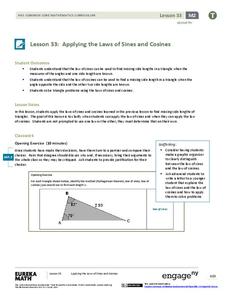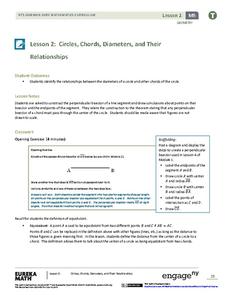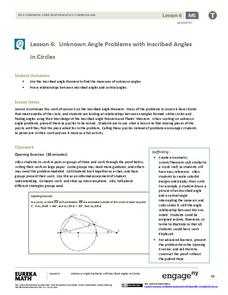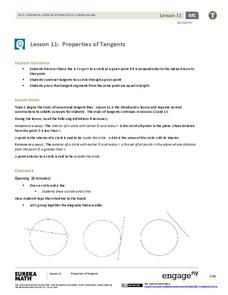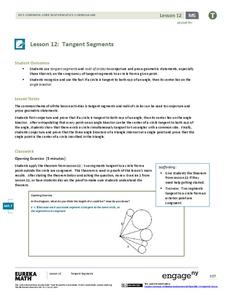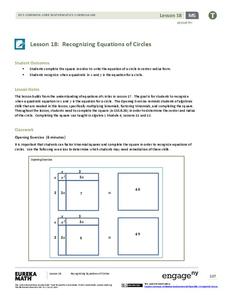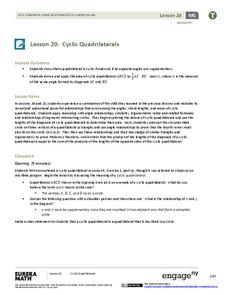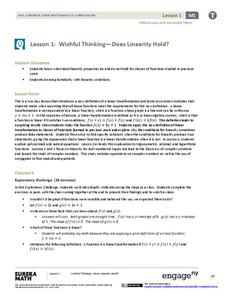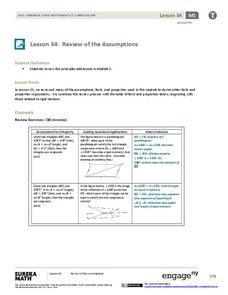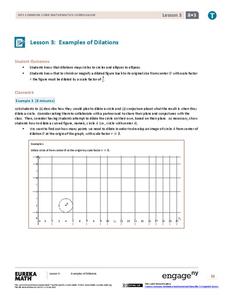EngageNY
How Do Dilations Map Segments?
Do you view proofs as an essential geometric skill? The resource builds on an understanding of dilations by proving the Dilation Theorem of Segments. Pupils learn to question and verify rather than make assumptions.
EngageNY
Applying the Laws of Sines and Cosines
Breaking the law in math doesn't get you jail time, but it does get you a wrong answer! After developing the Law of Sines and Cosines in lesson 33 of 36, the resource asks learners to apply the laws to different situations. Pupils must...
NASA
Raisin Bread Universe
What is the universal breakfast? The resource includes two activities, the first one observing oatmeal to understand the texture of the universe. Then, scholars measure raisin bread dough before and after it rises to represent the...
EngageNY
Circles, Chords, Diameters, and Their Relationships
A diameter is the longest chord possible, but that's not the only relationship between chords and diameters! Young geometry pupils construct perpendicular bisectors of chords to develop a conjecture about the relationships between chords...
EngageNY
Experiments with Inscribed Angles
Right angles, acute angles, obtuse angles, central angles, inscribed angles: how many types of angles are there? Learners first investigate definitions of inscribed angles, central angles, and intercepted arcs. The majority of the...
EngageNY
Inscribed Angle Theorem and Its Applications
Inscribed angles are central to the lesson. Young mathematicians build upon concepts learned in the previous lesson and formalize the Inscribed Angle Theorem relating inscribed and central angles. The lesson then guides learners to prove...
EngageNY
Unknown Angle Problems with Inscribed Angles in Circles
We know theorems about circles—now what? Class members prove a theorem, with half the class taking the case where a point is inside the circle and half the class taking the case where a point is outside the circle. The lesson then...
EngageNY
The Angle Measure of an Arc
How do you find the measure of an arc? Learners first review relationships between central and inscribed angles. They then investigate the relationship between these angles and their intercepted arcs to extend the Inscribed Angle Theorem...
EngageNY
Arc Length and Areas of Sectors
How do you find arc lengths and areas of sectors of circles? Young mathematicians investigate the relationship between the radius, central angle, and length of intercepted arc. They then learn how to determine the area of sectors of...
EngageNY
Properties of Tangents
You know about the tangent function, but what are tangent lines to a circle? Learners investigate properties of tangents through constructions. They determine that tangents are perpendicular to the radius at the point of tangency,...
EngageNY
Tangent Segments
What's so special about tangents? Learners first explore how if a circle is tangent to both rays of an angle, then its center is on the angle bisector. They then complete a set of exercises designed to explore further properties and...
EngageNY
Secant Lines; Secant Lines That Meet Inside a Circle
Young mathematicians identify different cases of intersecting secant lines. They then investigate the case where secant lines meet inside a circle.
EngageNY
Recognizing Equations of Circles
What does completing the square have to do with circles? Math pupils use completing the square and other algebraic techniques to rewrite equations of circles in center-radius form. They then analyze equations of the form x^2 + y^2 + Ax +...
EngageNY
Equations for Tangent Lines to Circles
Don't go off on a tangent while writing equations of tangent lines! Scholars determine the equations for tangent lines to circles. They attempt both concrete and abstract examples, such as a tangent line to the unit circle through...
EngageNY
Cyclic Quadrilaterals
What does it mean for a quadrilateral to be cyclic? Mathematicians first learn what it means for a quadrilateral to be cyclic. They then investigate angle measures and area in such a quadrilateral.
EngageNY
Solving and Graphing Inequalities Joined by “And” or “Or”
Guide your class through the intricacies of solving compound inequalities with a resource that compares solutions of an equation, less than inequality, and greater than inequality. Once pupils understand the differences, the...
EngageNY
Wishful Thinking—Does Linearity Hold? (Part 1)
Not all linear functions are linear transformations — show your class the difference. The first instructional activity in a unit on linear transformations and complex numbers that spans 32 segments introduces the concept of linear...
EngageNY
Construct a Square and a Nine-Point Circle
Anyone can draw a square, but can you CONSTRUCT a square? Here is a resource that challenges math scholars to create steps to finish their own construction. They test their ability to read and follow directions to complete a construction...
EngageNY
Review of the Assumptions (part 2)
Is the amount of information getting overwhelming for your geometry classes? Use this strategy as a way to organize information. The resource provides a handout of information studied in relation to triangle congruence. It includes a...
EngageNY
Looking More Carefully at Parallel Lines
Can you prove it? Making assumptions in geometry is commonplace. This resource requires mathematicians to prove the parallel line postulate through constructions. Learners construct parallel lines with a 180-degree rotation and then...
EngageNY
Solving Problems in Two Ways—Rates and Algebra
Build confidence by using multiple approaches to problem solving! This resource uses a visual and algebraic approach to solving application problems. A discussion is included about efficient approaches to different problems.
EngageNY
Graphs of Functions and Equations
Explore the graphs of functions and equations with a resource that teaches scholars how to graph functions as a set of input-output points. They learn how the graph of a function is the graph of its associated equation.
Messenger Education
Exploring Solar Systems Across the Universe
Scientists have theorized that our solar system formed 4.6 billion years ago. In this pair of activities, learners first hypothesize how our solar system was formed. Using this information, groups then determine how scientists search for...
EngageNY
Examples of Dilations
Does it matter how many points to dilate? The resource presents problems of dilating curved figures. Class members find out that not only do they need to dilate several points but the points need to be distributed about the entire curve...
Other popular searches
- Substitute Teacher Resources
- Science Teacher Resources
- Teacher Resources Tenses
- Math Teacher Resources
- Esl Teacher Resources
- Computer Teacher Resources
- Teacher Resources Visual Art
- Download Teacher Resources
- French Teacher Resources
- Teacher Resources Rating=3
- Math Teacher Resources K12
- Free Esl Teacher Resources

